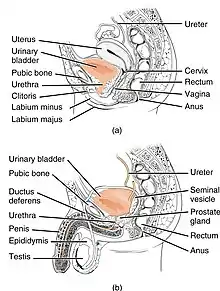urethra
English

The urethra is labelled in these diagrams of the female and male genitourinary systems
Etymology
A learned borrowing from Ancient Greek οὐρήθρα (ourḗthra, “the passage for urine”), from οὐρέω (ouréō, “to make water”). Recorded in English since 1634.
Pronunciation
- (US) IPA(key): /jʊˈɹiːθɹə/
Noun
urethra (plural urethras or urethrae)
- (anatomy) The tube through which urine exits the body and, in penises, through which semen is ejaculated.
Derived terms
Translations
anatomical tube
|
See also
Dutch
Etymology
Borrowed from Latin ūrēthra, from Ancient Greek οὐρήθρα (ourḗthra).
Pronunciation
- IPA(key): /ˌyˈreː.traː/
Audio (file) - Hyphenation: ure‧thra
Derived terms
Latin
Etymology
Borrowed from Ancient Greek οὐρήθρα (ourḗthra).
Pronunciation
- (Classical) IPA(key): /uːˈreː.tʰra/, [uːˈreːt̪ʰrä]
- (Ecclesiastical) IPA(key): /uˈre.tra/, [uˈrɛːt̪rä]
Declension
First-declension noun.
| Case | Singular | Plural |
|---|---|---|
| Nominative | ūrēthra | ūrēthrae |
| Genitive | ūrēthrae | ūrēthrārum |
| Dative | ūrēthrae | ūrēthrīs |
| Accusative | ūrēthram | ūrēthrās |
| Ablative | ūrēthrā | ūrēthrīs |
| Vocative | ūrēthra | ūrēthrae |
References
- “urethra”, in Charlton T. Lewis and Charles Short (1879) A Latin Dictionary, Oxford: Clarendon Press
- urethra in Gaffiot, Félix (1934) Dictionnaire illustré latin-français, Hachette
This article is issued from Wiktionary. The text is licensed under Creative Commons - Attribution - Sharealike. Additional terms may apply for the media files.